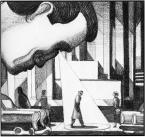In the winter of 2011, former professor and journalist Loren Ghiglione and two students of journalism, Dan Tham and Alyssa Karas, loaded up a van and set out on a road trip across the country with a big goal in mind — to search for American cultural identity.
Twenty-eight states, 14,063 miles, three months and 150 interviews later, Mr. Ghiglione and his students found their answer — a colorful tapestry of testimonies about race, sexual orientation, gender and, more broadly, what it means to be American. The book that emerged from this wide array of stories — a blend of history, memoir and reporting, called Genus Americanus — is slated for release this month.
In a recent interview with the Gazette at his Chilmark home, Mr. Ghiglione reflected on the trip, the book and what the project taught him about the country.
“I wanted to make a point about identity issues, that they’re complex....It’s not simply race. So many things play into identity,” Mr. Ghiglione said.
The project began as an on-the-road blog called Traveling with Twain, said Mr. Ghiglione, who was inspired by Mark Twain and his engagement with issues of race and identity in his day.
“[Twain] evolved from a kid growing up in a very southern town where bigotry against African Americans was sort of assumed and overcame that. I admired that part of his life.”
Following Twain’s footsteps from Missouri to the West, the Northeast and finally the South, the group traveled to important landmarks in the author’s life and in Mr. Ghiglione’s career, sometimes interviewing 10 people a day as they went. The group interviewed a broad range of professors, scholars and journalists — all experts in their fields — but as the project evolved from blog to book, the real heart of it, Mr. Ghiglione realized, was in the testimonies of the regular Americans he met while pounding the pavement.
“I thought of myself as a reporter,” Mr. Ghiglione said, recounting with warmth the many names and faces he encountered on the trail. “The whole book I was really more interested in listening to people than coming up with a theory of what was happening around identity.”
Following the initial road trip, Mr. Ghiglione returned to many locations to follow-up with interviewees before beginning the writing process. Start to finish, the project took nearly a decade.
Mr. Ghiglione’s interest in identity dates back to his early career as a journalist and experiences writing about social issues, he said. As an intern out of college, he helped cover the March on Washington for the Washington Post. Later in his career, he advised the student paper at the historically black Rust College in Mississippi during the Freedom Summer of 1964.
More personally, the book was inspired by Mr. Ghiglione’s experience as a descendant of Italian immigrants.
“I wanted to talk about my own immigrant family. I wanted to be able to make a comparison [between race and immigration status] because I feel a lot of people in the society who benefited from coming here don’t make those connections.”
Mr. Ghiglione also stressed the importance of engaging with issues of race and identity as a straight, white male.
“There’s some people who probably say you shouldn’t be writing this book, but you have to acknowledge that and move on,” he said. “It’s important, since they’re a major part of the problem, for white folks to try to deal with these issues and try to admit their ignorance, admit their blind spots and try to address them.”
Though the book focuses on personal identity, it also reflects the political moment in which it was written, Mr. Ghiglione said, noting that much of the reporting and the writing took place as the country transitioned from eight years of President Obama to the President Trump era.
“I hate to sound political about this, but it’s hard not to think about how issues of identity are being presented by the President,” he said.
Following the nationwide Black Lives Matter protests this summer, Mr. Ghiglione added a short segment to the book late in the publishing process about current events. But despite recent attention to racial and social injustice, the author said he hoped the book serves as a reminder that identity-based discrimination long preceded the Trump administration.
“I tried to incorporate some of the current events and it actually fits with what was going on, from 2011 to the present. It wasn’t just Trump, that’s another thing I would say. He’s an easy target.”
With publication now underway, Mr. Ghiglione said he hopes the book will push readers to have the sometimes uncomfortable conversations about their own complicity in systems of inequality.
“It’s about just trying to tell stories about the life experiences of people who have been on the other side of discrimination,” he said. “I would like average Americans to think about how they live their lives, how they bring up their children and grandchildren, and to listen to these voices.”







Comments (1)
Comments
Comment policy »